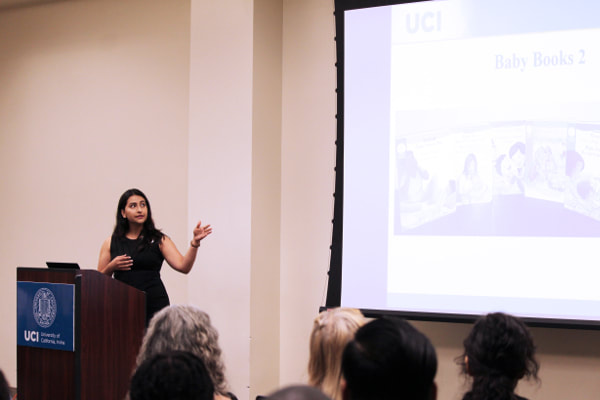|
Competitive Edge Summer Research Program
Symposium Presentation: August 16, 2018 UCI Student Center Title: "Latinx Parents’ Values, Discipline Beliefs and Practices" Presenter: Maritza Morales-Garcia Faculty Advisor: Stephanie Reich Abstract Negative punitive discipline practices have previously been linked to negative outcomes for children (Gershoff et al., 2018). Positive discipline, a less studied parenting practice, is aimed towards teaching children (e.g., positive reinforcement, redirection), as opposed to simply punishing children (Carroll & Hamilton, 2016). However, the existing literature on discipline is disproportionately focused on African-American and Caucasian mothers, with Latinx mothers and fathers of young infants often being excluded. Given that 2/3 of Latinx children live with both parents, and that Latinx individuals now comprise 1/5 of the total U.S. population (Pew Research Center, 2015), it is critical that we examine cultural values on child development along with positive and negative discipline beliefs and practices of Latinx mothers and fathers. This study addresses these gaps by looking at parental importance placed on child qualities as well as positive and negative discipline beliefs and practices among cohabitating, new Latinx mothers and fathers. Specifically: (1) How are positive and negative discipline beliefs related to positive and negative discipline practices? (1a) How do these associations compare among mothers and fathers? (2) How do parental values of child qualities relate to positive and negative discipline practices? (2a) How do these associations compare among mothers and fathers? While data collection is underway, the current sample includes 127 socioeconomically diverse Latinx parents (n= 65 moms, n=60 dads) of 9-month old children, recruited for the Baby Books 2 Project in Southern California and Washington D.C. area. Mothers and fathers are surveyed when their child is 9 months old about: 1) discipline beliefs (e.g., Negative: children mainly cry to get attention, Positive: rewarding children’s appropriate behavior with praise is a good form of discipline), 2) discipline practices (e.g., Negative: threatened to spank child, Positive: distracted child), and 3) qualities they find important for their child to develop (e.g., respectful, works hard at school, to be a leader), and 4) demographic information. Regression analysis will be utilized to answer the study questions. This study is a first step to better understanding Latinx families’ cultural values as well as parental myths that may play a role in norms surrounding discipline practices. It is critical to build this body of knowledge in order to generate more culturally grounded research and understanding of diverse populations. Finally, it is critical for researchers, practitioners, and policies to reflect the values of the communities that they serve. Comments are closed.
|
Resources for:
|
|


